이태리 영화 감독과 그들이 감독한 영화의 소개는 로베르토 로셀리니, 비토리오 데 시카,
페데리코 펠리니, 루치노 비스콘티, 미켈란제로 안토니오니, 베르나르도 베르토루치,
쥬세페 토르나토레 등 7명을 선정하여 실시하려고 한다.
(1) 로베르토 로셀리니(Roberto Rossellini 1906~1977)

Roberto Rossellini (8 May 1906 – 3 June 1977) was an Italianfilm director and screenwriter.
Rossellini was one of the directors of the Italian neorealist cinema, contributing films
such as Roma città aperta (Rome, Open City 1945) to the movement.
무방비 도시(Roma, città aperta, 1945)
Rome, Open City (Italian: Roma, città aperta) is a 1945 Italianwar drama film,
directed by Roberto Rossellini. The picture features Aldo Fabrizi, Anna Magnani
and Marcello Pagliero, and is set in Rome during the Nazi occupation in 1944.
The film won several awards at various film festivals and was also nominated for
an Academy Award for Best Adapted Screenplay.

'무방비도시'는 로베르토 로셀리니의 명작이자 전후 이태리 네오리얼리즘의 대표격인 영화다.
나치점령하의 로마에서 나치의 무자비한 레지스탕스 탄압, 양민 학살 등을 리얼하게 묘사했다.

항의하는 안나 마냐니를 나치군인들은 무자비하게 사살하고 가버린다.

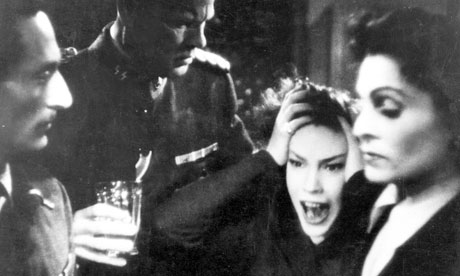


라스트 신에서 나치가 신부까지 총살하는 장면은 매우 충격적이다.
로베레 장군 (generale della Rovere, 1959)

General della Rovere (Italian: Il generale della Rovere) is a 1959 Italian film directed by Roberto Rossellini.
The film is based on a novel by Indro Montanelli which was in turn based on a true story.
The film tells the story of a petty thief (played by Vittorio De Sica) who is hired by the Nazis to impersonate
an Italian resistance leader, General della Rovere, and infiltrate a group of resistance prisoners in a Milan prison.

가짜 로베레 장군이 진짜로 되는 이야기

미라노 교도소에 수감된 레지스탕스의 리더를 식별해내기 위해 나치가 투입시킨
가짜 로베레장군이 교도소내의 비참한 현실에 직면하여 점차 진짜 로베레 장군으로
변모해가는 과정을 실감나게 묘사했다.


비토리오 데 시카의 명연기가 단연 돋보인 영화였다.

The film won the Golden Lion at the Venice Film Festival.
안나 마냐니와 즐거웠던 시절의 로베르토 로셀리니

그후 잉그리드 버그만과 결혼하여 단란했던 시절의 로셀리니

7년간의 결혼생활에서 이들은 아들 1, 딸 2(쌍둥이)을 낳고는 헤어졌다.

(2) 비토리오 데 시카(Vittorio De Sica 1901~1974)
Vittorio De Sica (7 July 1901 or 1902 – 13 November 1974) was anItalian director and actor,
a leading figure in the neorealistmovement.
In his career, four of the films he directed won Academy Awards:Sciuscià and Ladri di biciclette were
awarded honorary Oscars, while ieri, oggi, domani and Il giardino dei Finzi Contini won
theBest Foreign Language Film Oscar. Indeed, the great critical success of Sciuscià (the first foreign film
to be so recognized by the Academy of Motion Picture Arts and Sciences) and Ladri di biciclette helped
establish the permanent Best Foreign Film Oscar. These two films generally are considered part of
the canon of classic cinema. Ladri di biciclette was cited by Turner Classic Movies as one of
the 15 most influential films in cinema history.
비토리오 데 시카의 네오리얼리즘계열의 대표적인 작품은 '구두닦이'와 '자전거 도둑'이다.
구두닦이 Sciuscià (Shoeshine 1946)
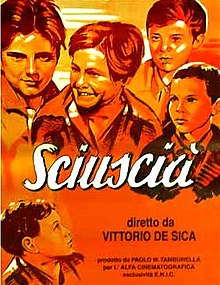




자전거 도둑(Ladri Di Biciclelle 1947)
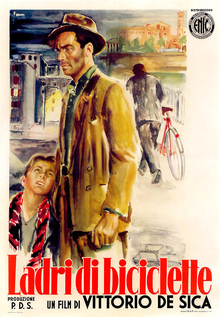




두 여인 (La ciociara, 1960)
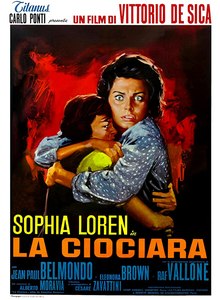
Two Women (Italian: La ciociara, roughly translated as "[The Woman] from Ciociaria") is a 1960
Italian film directed by Vittorio De Sica. It tells the story of a woman trying to protect her young
daughter from the horrors of war. The film stars Sophia Loren,Jean-Paul Belmondo,
Eleonora Brown, Carlo Ninchi and Andrea Checchi. The film was adapted by De Sica and
Cesare Zavattini fromthe novel of the same name written by Alberto Moravia



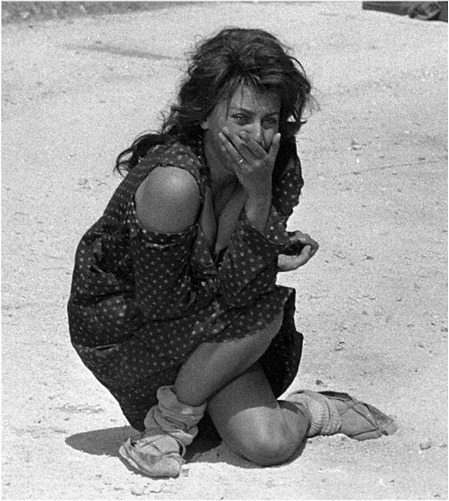

알베르토 모라비아 원작 소설을 체자레 자바티니가 각색, 데시카가 감독한 작품
전쟁중 연합군 에티오피아 병사들에 의해 겁탈당하는 母女의 이야기
(3)페데리코 펠리니(Federico Fellini 1920~1993)
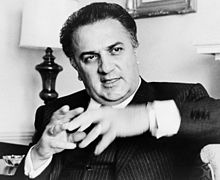
Federico Fellini, (Italian pronunciation: [fedeˈriːko felˈliːni]; January 20, 1920 – October 31, 1993),
was an Italian film director andscriptwriter. Known for a distinct style that blends fantasy
and baroque images,
he is considered one of the most influential filmmakers of the 20th century, and is widely revered.
He won five Academy Awards and was nominated for 12 in a career that spanned over forty years.
길 (La Strada 1954)

La Strada (English: The Road) is a 1954 Italian neorealist drama directed by Federico Fellini
in which a naïve young woman (Giulietta Masina) is sold to a brutish man (Anthony Quinn)
and goes on the road as a part of his itinerant show.
La Strada won the Academy Award for Best Foreign Language Film in 1956,
the first presented in that category.
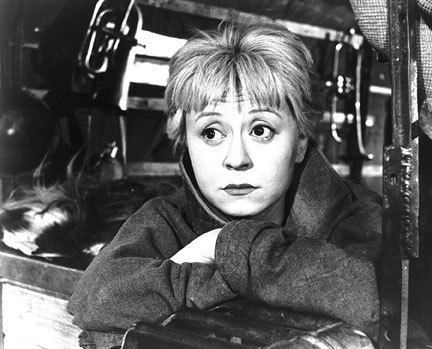




짬파노와 젤소미나의 이야기는 설명이 필요없을 것이다.

젤소미나는 떠나갔지만 그녀는 야수같은 사내 잠파노의 영혼을 일깨웠다.
카비리아의 밤 Nights of Cabiria (1957)


.jpg)
달콤한 인생 La Dolce Vita (1960)

La Dolce Vita (Italian pronunciation: [la ˈdoltʃe ˈviːta]; Italian for "the sweet life" or "the good life") is
a 1960 comedy-drama filmwritten and directed by the critically acclaimed director Federico Fellini.
The film is a story of a passive journalist's week in Rome, and his search for both happiness and love
that will never come. Generally cited as the film that marks the transition between Fellini's earlier
neo-realist films and his later art films, it is widely considered as one of the great achievements
in world cinema, and had won the Palme d'Or (Golden Palm) at the 1960 Cannes Film Festival.
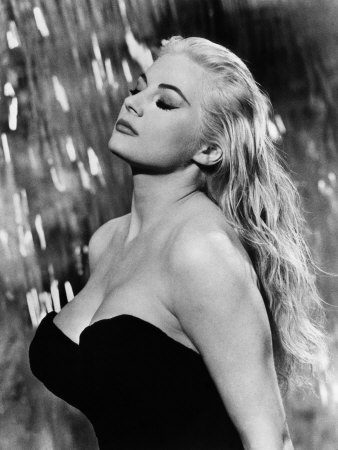




8½ (Otto e Mezzo, 1963)

8½ is a 1963 Italian comedy-drama film directed by Federico Fellini. Co-scripted by Fellini,
Tullio Pinelli, Ennio Flaiano, and Brunello Rondi, it stars Marcello Mastroianni as Guido Anselmi,
a famous Italian film director. Shot in black-and-white bycinematographer Gianni di Venanzo,
the film features a soundtrack by Nino Rota with costume and set designs by Piero Gherardi.
Its title refers to Fellini's eighth and a half film as a director. His previous directorial work consisted of
six features, two short segments, and a collaboration with another director,
Alberto Lattuada, the latter three productions accounting for a "half" film each.
8½ won two Academy Awards for Best Foreign Language Film andBest Costume Design
(black-and-white). Acknowledged as anavant-garde (disambiguation) film[2] and a highly influential classic,
it was ranked third best film of all time in a 2002 poll of film directors conducted by the British Film Institute
and is also listed on the Vatican's compilation of the 45 best films made before 1995,
the 100th anniversary of cinema.
페데리코 페리니의 자서전적인 영화
마르첼로 마스트로얀니, 클라우디아 카르디날레, 아누크 에이메 등 공연


클라우디나 키르디날레의 연기지도를 하는 페리니 감독



페데리코 페리니는 24살 때 로베르토 로셀리니의 '무방비 도시'의 각본을 썼다.
그의 작품과 수상경력은 아래와 같다.
Selected awards and nominations
- Rome, Open City (Dir. Roberto Rossellini, 1945)
- Oscar nomination for Best Screenplay (with Sergio Amidei)
- Paisà (Dir. Roberto Rossellini, 1946)
- Oscar nomination for Best Screenplay (with Sergio Amidei, Alfred Hayes, Marcello Pagliero, and Rossellini)
- I Vitelloni (1953)
- Venice Film Festival Silver Lion
- Oscar nomination for Best Screenplay (with Tullio Pinelli, Ennio Flaiano)
- La Strada (1954)
- Venice Film Festival Silver Lion
- Oscar for the Best Foreign Language Film[71]
- Oscar nomination for Best Screenplay (with Tullio Pinelli, Ennio Flaiano)
- New York Film Critics Award for Best Foreign Film
- Screen Directors Guild Award for Best Foreign Film
- Nights of Cabiria (1957)
- Festival de Cannes Best Actress Award (Giulietta Masina)[72]
- Oscar for the Best Foreign Language Film[73]
- La Dolce Vita (1960)
- Palme d'Or at Festival de Cannes
- Oscar Best Costumes in B&W (Piero Gherardi)
- Oscar nominations for Best Director, Best Screenplay (with Tullio Pinelli, Ennio Flaiano, Brunello Rondi), Best Art and Set Direction
- New York Film Critics Award for Best Foreign Language Film
- National Board of Review citation for Best Foreign Language Film
- 8½ (Otto e Mezzo, 1963)
- Moscow International Film Festival Grand Prize
- Oscar for Best Foreign Language Film[74]
- Oscar for Best Costumes in B&W (Piero Gherardi)
- Oscar nomination for Best Director
- Oscar nomination for Best Art Direction-Set Decoration in B&W (Piero Gherardi)
- Italian National Syndicate of Film Journalists Silver Ribbons for Best Cinematography in B&W (Gianni Di Venanzo), Best Director (Federico Fellini), Best Original Story (Fellini and Flaiano), Best Producer (Angelo Rizzoli), Best Score (Nino Rota), Best Screenplay (Fellini, Pinelli, Flaiano, Rondi), and Best Supporting Actress (Sandra Milo)
- Berlin Film Festival Special Award
- BAFTA Film Award nomination for Best Film from any Source
- Bodil Award for Best European Film
- Directors Guild of America Award for Outstanding Directorial Achievement in Motion Pictures
- New York Film Critics Award for Best Foreign Film
- National Board of Review Award for Best Foreign Language Picture
- Grolla d’Oro at Saint Vincent Film Festival for Best Director
- Kinema Junpo Award for Best Foreign Language Film & Best Foreign Language Film Director
- Juliet of the Spirits (1965)
- New York Film Critics Award for Best Foreign Film
- National Board of Review Award for Best Foreign Language Story
- Golden Globe Award for Best Foreign Language Film
- Satyricon (1969)
- Oscar nomination for Best Director[75]
- I clowns (1970)
- National Board of Review citation for Best Foreign Language Film
- Amarcord (1974)
- Oscar for Best Foreign Film[44]
- Oscar nomination for Best Director
- Oscar nomination for Best Writing, Original Screenplay
- New York Film Critics Award for Best Direction
- New York Film Critics Award for Best Motion Picture
- Fellini's Casanova (1976)
- Oscar for Best Costumes (Danilo Donati)
- Intervista (1987)
- Moscow International Film Festival Grand Prize
- Festival de Cannes Special 40th Anniversary Prize
- The Voice of the Moon (1990)
- David di Donatello Awards for Best Actor, Best Production Design, and Best Editing
페데리코 페리니는 스웨덴의 잉그마르 베르히만(Ingmar Bergman)과 함께
영화비평가들로부터 전후 가장 주목받는 유럽의 영화감독으로 평가받았다.
'━━ 감성을 위한 ━━ > 영화이야기' 카테고리의 다른 글
| 우리가 사랑했던 그 모든 여배우들 All The Girls We've Loved (0) | 2012.03.28 |
|---|---|
| 명감독, 명화 이야기(8)-이태리 영화(2-2)| (0) | 2012.03.27 |
| 명감독, 명화 이야기(6)ㅡ프랑스 영화(2-2) (0) | 2012.03.15 |
| 명감독, 명화 이야기(5)ㅡ프랑스 영화(2-1) (0) | 2012.03.12 |
| 추억의 명화 '망향'(Pepe le Moko, 1937) (0) | 2012.03.10 |
